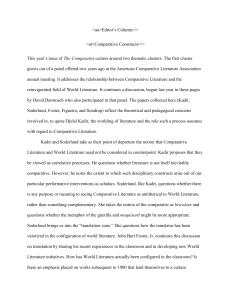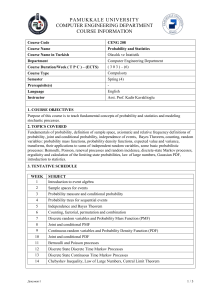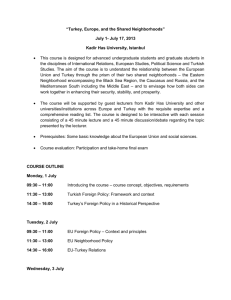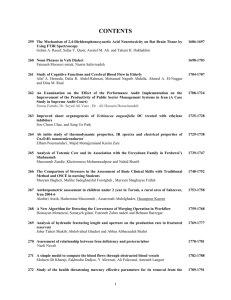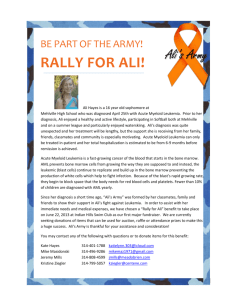Chapter 5 Script (doc 35.5 KB)
advertisement
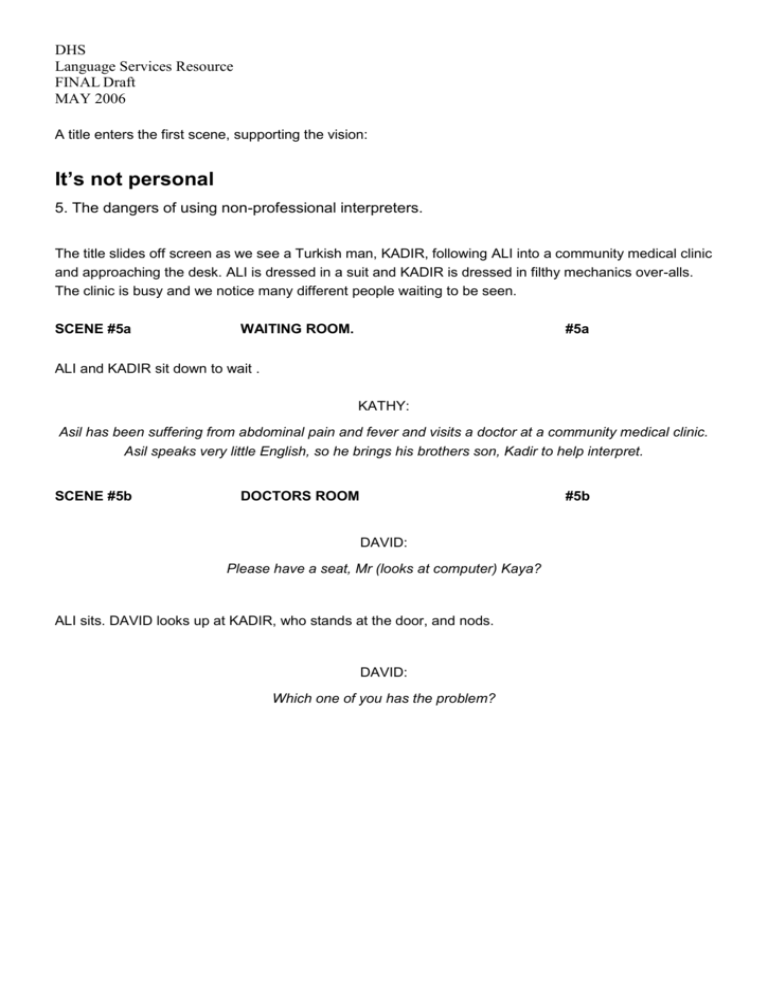
DHS Language Services Resource FINAL Draft MAY 2006 A title enters the first scene, supporting the vision: It’s not personal 5. The dangers of using non-professional interpreters. The title slides off screen as we see a Turkish man, KADIR, following ALI into a community medical clinic and approaching the desk. ALI is dressed in a suit and KADIR is dressed in filthy mechanics over-alls. The clinic is busy and we notice many different people waiting to be seen. SCENE #5a WAITING ROOM. #5a ALI and KADIR sit down to wait . KATHY: Asil has been suffering from abdominal pain and fever and visits a doctor at a community medical clinic. Asil speaks very little English, so he brings his brothers son, Kadir to help interpret. SCENE #5b DOCTORS ROOM #5b DAVID: Please have a seat, Mr (looks at computer) Kaya? ALI sits. DAVID looks up at KADIR, who stands at the door, and nods. DAVID: Which one of you has the problem? DHS Language Services Resource FINAL Draft MAY 2006 KADIR: Oh, I’m Kadir, this is my uncle, Ali. He speaks no English and I speak a little Turkish. My dad thought I could help. DAVID checks his watch, frowns and indicates to KADIR to sit. DAVID: Okay then. So Ali is the one that is sick? KADIR: Yeah - him, not me. DAVID: Okay. Could you ask what is wrong with Ali? KADIR: There’s something wrong with his stomach – my dad says he’s been throwing up for a couple of days. DAVID: Okay, could you ask Ali to describe his symptoms please? – I need more specific information. KADIR (distracted): Sorry, I missed that. DHS Language Services Resource FINAL Draft MAY 2006 DAVID: Ask him what type of pain he is experiencing. - Please try to be specific. KADIR: Sorry, my Turkish is a little rusty… KADIR pauses before launching into very clumsy Turkish. KADIR (In Turkish): The doctor wants to know more about the pain. ASIL (In Turkish): Like a knife – right here. KADIR: He says the pain is like a knife – deep in there. DAVID: Is there nausea – upset stomach - vomiting? KADIR nods. DAVID: Could you please ask Ali? KADIR (In Turkish): Do you feel sick in your stomach? ALI nods his head to say yes. DAVID: Do you have problems with your bowels? DHS Language Services Resource FINAL Draft MAY 2006 KADIR: You mean when he has a shit? DAVID: Yes. When he defecates – when he passes solids. KADIR pauses then laughs while ALI sits opposite, looking confused. ALI (In Turkish): What is funny? DAVID: I’m sorry, I don’t get the joke. KADIR: Sorry mate - what do you want me to ask him? DAVID: I’m very busy this morning - Can we find out what the problem is? KADIR nods. KADIR: Sorry – shoot. DHS Language Services Resource FINAL Draft MAY 2006 DAVID: Could you ask Asil if there is ever any blood when he goes to the toilet? KADIR: Blood? DAVID: Blood in his stool. In his solids. KADIR retracts with revulsion, the smile vanishes. DAVID: Is there something wrong? KADIR: Umm, no. It’s just…..I hardly know this guy. DAVID: So? KADIR: He’s my dad’s brother, man. You want me to ask him about his problems in the toilet…know what I mean? DAVID: Yeah, okay, but I need to know. Your uncle might be very ill. DHS Language Services Resource FINAL Draft MAY 2006 ALI (In Turkish): What is being said, Kadir? KADIR (In Turkish): One moment. DAVID waits while KADIR thinks of a way to ask the question. KADIR: You want me to ask if he is in pain when he….does number 2? DAVID: No, please ask if ASIL has seen any blood when he passes solids. KADIR: Oh, man. Okay. I just have to think about this. KADIR pauses before asking ALI the question. KADIR (In Turkish): The doctor wants to know if there is any blood. ALI (In Turkish): Blood? No the pain is here - inside. Why would there be blood? KADIR: No, No blood. DAVID: Did you ask him exactly what I asked? DHS Language Services Resource FINAL Draft MAY 2006 Your question seemed very short. KADIR: I asked him if there was any blood – he says no. DAVID makes some notes. KADIR nods at ALI as if to say “everything will be okay”. KATHY V/O AND 100% (Supported by vision/freeze frames/graphics) This scenario explores the dangers of using non-professional interpreters, such as family, friends, and persons under 18 years of age. In this example we examine a common occurrence where information is blurred and communication obscured by embarrassment, fear and ignorance. By failing to use a professional interpreter and not maintaining control of the situation, the doctor is neglecting his duty of care to the patient. The doctor could have discovered the correct diagnosis by quickly consulting a Turkish-speaking telephone interpreter and avoided what could turn out to be a life-threatening situation. Whenever in doubt, use a professional, accredited interpreter.
